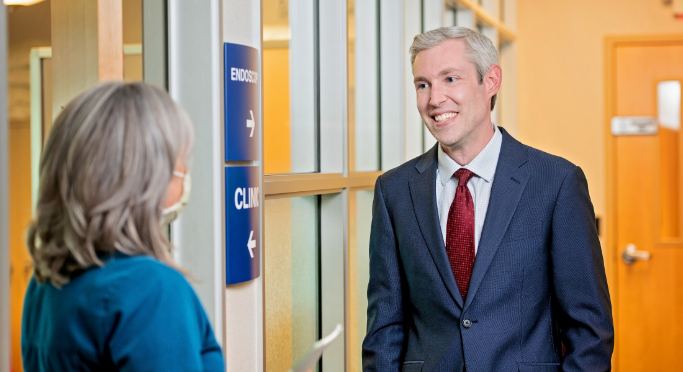What are Colorectal Polyps?
Colorectal polyps are small masses of cells that form on the lining of the colon. While most polyps are harmless, some may develop into colon or rectal cancer over time. The best way to prevent colorectal cancer is to detect and remove colorectal polyps before they become advanced or cancerous.
Most people with colorectal polyps do not experience any symptoms. However, some people with colorectal polyps may experience the following:
- Change in the color of your stool
- Rectal bleeding
- Cramping or abdominal pain
- A change in bowel habits
- Iron deficiency anemia
While anyone can develop colorectal polyps, individuals who are over the age of 50, are overweight, are smokers or have a family history of colorectal polyps may be at a higher risk.
How are Colon Polyps Diagnosed?
There are two primary categories of polyps, including non-neoplastic and neoplastic. Non-neoplastic polyps typically do not become cancerous, while neoplastic polyps may become cancerous over time. In order to detect polyps before they become cancerous, there are screening tests that can be done. Screening methods may include:
Colonoscopy
This test involves going on a clear liquid diet and taking a laxative 1-3 days before to clean out the colon. During the procedure, a long, thin tube with a light and camera will be inserted into the colon to look for polyps. If any polyps are found, they will be removed (unless the polyp is too large) and sent to be checked at a lab. This procedure usually takes about 20-30 minutes to complete. Colonoscopy is the only preferred tier 1 and most accurate test to detect and remove colorectal polyps.
Flexible Sigmoidoscopy
A flexible sigmoidoscopy is similar to a colonoscopy, but there is not as much bowel prep required. A thin tube with a light will be placed into the lower part of the colon and rectum to look for polyps. The test usually takes about 20 minutes.
Stool Tests
These tests check for blood in the stool, or assess your stool DNA. Unfortunately, these tests are not very accurate to detect polyps, and can miss colon cancers. Also, if your stool test is positive a colonoscopy is recommended as the next step.
Colorectal Polyp Treatment Options
If polyps are detected in the colon through a screening test, your doctor is likely to remove them. Options for removal may include:
Polypectomy: During a colonoscopy or flexible sigmoidoscopy, the polyps will be removed with forceps or a wire loop. If the polyps are too large to remove this way, surgery may be required. Once removed, the polyps will be sent to the lab to test for cancer.
Surgery: For individuals with a genetic condition such as familial adenomatous polyposis (FAP), your provider may recommend surgery to remove part of or all of the colon and rectum. This is the most effective solution when it comes to preventing colon cancer for those with these conditions.
Because colorectal polyps may return later on in life, intermittent screening tests are recommended.
Frequently Asked Questions About Colorectal Polyps
How often should you have a colonoscopy after finding polyps?
What causes colon polyps?
Can polyps restrict bowel movements?
Can a doctor tell if a polyp is cancerous during colonoscopy?
How do you prevent colon polyps from returning?
How common are colon polyps?
How worried should I be about colon polyps?
How many years does it take for a colon polyp to become cancerous?
Where is the most common location for polyps?
Your South Denver GI Team
At South Denver GI, our team of physicians and advanced practice providers have the expertise to provide you with outstanding care. If you would like to learn more about Colorectal Polyps or need to schedule an appointment at our office, contact us today!
View All Our Providers
Contact Us Today
Are you experiencing colorectal polyp symptoms, or have been diagnosed with polyps and are seeking treatment? If this sounds like you, do not hesitate to contact South Denver GI today to schedule an appointment with one of our skilled providers.
Contact UsRequest Appointment
Click on the Schedule Appointment button to schedule an appointment with your South Denver GI provider online. If you do not wish to use our convenient online scheduling tool, please fill out the form below and our team will contact you shortly.







